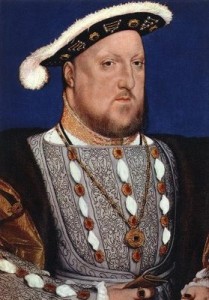 On 27th April 1536, writs were issued summoning Parliament, and a letter was sent to Thomas Cranmer, the Archbishop of Canterbury, asking him to attend Parliament. Here is the relevant section from the Letters and Papers, Foreign and Domestic, Henry VIII:
On 27th April 1536, writs were issued summoning Parliament, and a letter was sent to Thomas Cranmer, the Archbishop of Canterbury, asking him to attend Parliament. Here is the relevant section from the Letters and Papers, Foreign and Domestic, Henry VIII:
“Summons to the archbishop of Canterbury to attend the Parliament which is to meet at Westminster, 8 June; and to warn the prior and chapter of his cathedral and the clergy of his province to be present, the former in person and the latter by two proctors. Westm., 27 April 28 Hen. VIII.
ii. Similar writs to the different bishops, abbots, and lords; to the judges, serjeants-at-law, and the King’s attorney, to give counsel; to the sheriffs to elect knights of the shires, citizens, and burgesses; also to the chancellor of the county palatine of Lancaster; to the deputy and council of Calais to elect one burgess, and to the mayor and burgesses to elect another.”1
Although Anne Boleyn and the five men found guilty of adultery with her were all dead by the 8th June, these writs coming so soon after the setting up of the commissions of oyer and terminer suggests that Parliament was being called in order to deal with issues regarding the Queen, the King’s marriage and the succession.
(Extract taken from The Fall of Anne Boleyn: A Countdown by Claire Ridgway)
Meanwhile, on the same day that these writs were being issued, John Stokesley, Bishop of London, was approached to give advice on whether the King could ‘abandon’ Anne Boleyn, Eustace Chapuys, the imperial ambassador records:
“The brother of lord Montague told me yesterday at dinner that the day before the bishop of London had been asked if the King could abandon the said concubine, and he would not give any opinion to anyone but the King himself, and before doing so he would like to know the King’s own inclination, meaning to intimate that the King might leave the said concubine, but that, knowing his fickleness, he would not put himself in danger. The said Bishop was the principal cause and instrument of the first divorce, of which he heartily repents, and would still more gladly promote this, the said concubine and all her race are such abominable Lutherans. London, 29 April 1536.”2
Notes and Sources
- L&P, x. 736
- L&P, x. 752